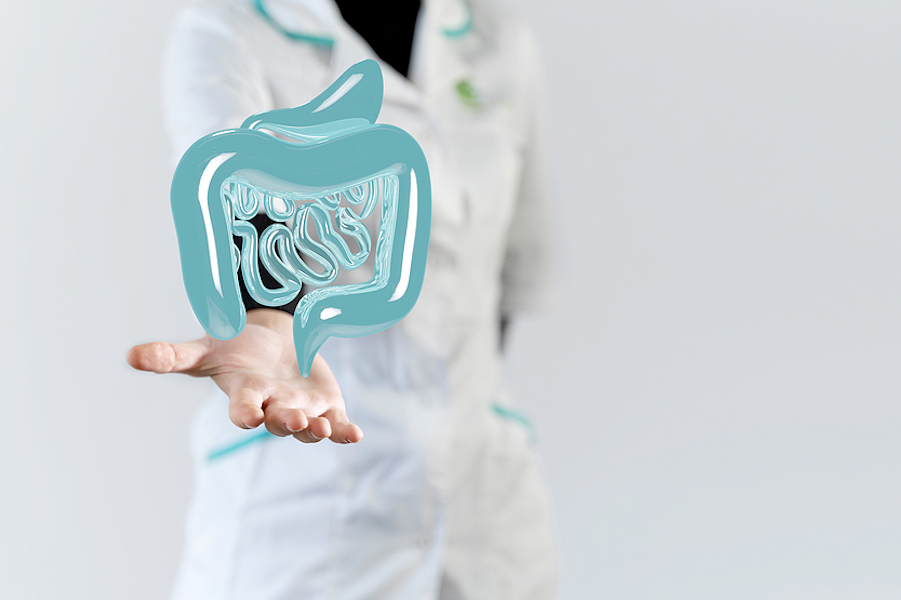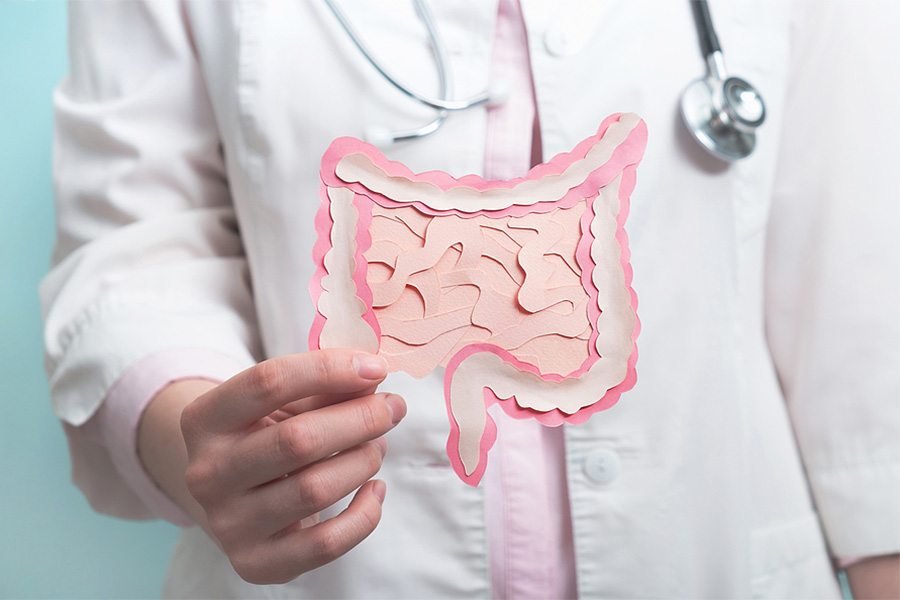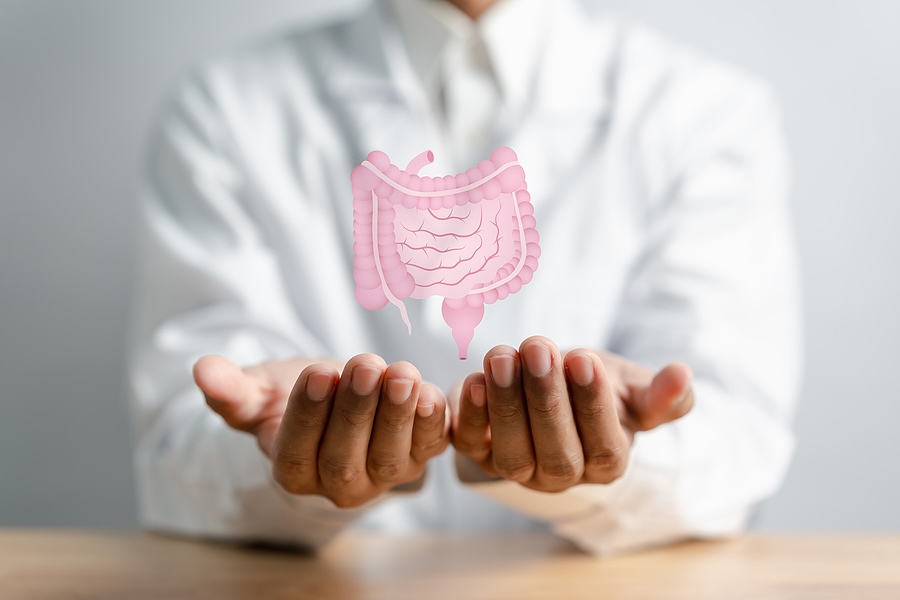Is your body burning to tell you something? In functional medicine, practitioners consider the health of your digestive system to be as crucial as the health of your brain. In fact, many chronic conditions start with poor digestion, sending out clues in the form of indigestion and heartburn. For many women, ignoring these signs over time can lead to a more severe condition, such as acid reflux.
Scientists estimate that more than 15 million Americans suffer from acid reflux disease, also known as gastroesophageal reflux disease or GERD, in which acid from the stomach flows up into the esophagus, causing discomfort, inflammation and sometimes scarring. Thanks to incessant advertising, many people go to their doctors looking for an antacid or proton pump inhibitor (PPI) when they have acid reflux. But using these pills long-term could mask the signals your body is sending out and keep you from finding the real cause of your acid indigestion.
If you’re struggling with acid reflux symptoms, or you’ve already received a GERD diagnosis, it’s important to know that you can have much more control than popping a pill gives you. But it may not be as simple; you may need to urge your healthcare practitioner to help you find the root cause, or you may need to take on the investigation yourself. Either way, the good news is that symptoms of acid reflux respond extremely well to natural changes in diet and lifestyle — and you just might not need that prescription for a PPI to stop your body’s acid production. It’s simply a matter of figuring out where to begin.
What is GERD?
GERD — or gastroesophageal reflux disease — is the medical term for acid reflux. GERD can cause, among other symptoms, heartburn in the chest. Occasional heartburn can happen after a large meal or when you eat foods you are sensitive to, but GERD is diagnosed when the burning sensation occurs frequently, sometimes even continuously.
The problem of acid reflux begins when the gradient of pressure between the lower esophageal sphincter (the valve between the esophagus and the stomach) and the stomach is altered. Under normal circumstances, our muscles act with gravity to create pressure to push the food we eat downward from the esophagus into the stomach. With GERD, the pressure from the stomach below increases over the pressure from above, and the mixture of food and acid that should stay in the stomach comes splashing back up. A similar pressure gradient effect applies whenever we belch.
This reverse in flow can happen for many reasons, the most common being a loss of tone in the lower esophageal sphincter or LES. Think of the LES as a one-way valve similar to what controls the flow of water out of the spigot in your sink. When you turn the handle, the valve opens and water flows out. Likewise, when you eat, the LES opens to allow the contents of your meal to flow down into the stomach. The water should never reverse back into the faucet, and neither should the gastric contents in your stomach splash back up into the esophagus. But when the valve loses its tone, it can’t keep the acidic mixture down and you begin to feel the symptoms.
Some of the acid reflux symptoms you may experience include:
- Burning pain in your chest (heartburn) or upper abdomen
- Irritation in your throat
- Acid taste in your mouth
- Bad breath
- Laryngitis
- Chronic cough
- Difficulty swallowing
- Nausea
- Belching
Although acid reflux is common, it can be serious. Over time, regurgitation of acidic stomach contents can wear away the esophagus, eroding the delicate tissue, and causing inflammation and scarring. It can sometimes even lead to erosion of tooth enamel and, in extreme cases, to esophageal cancer. In fact, one in ten people with GERD go on to develop dangerous changes in the esophagus (known as Barrett’s esophagus) that can increase their chances of esophageal cancer.
Because of these long-term effects and because the symptoms are associated with many other diseases, including heart disease, H. pylori infection, gastritis (inflammation of the stomach lining), and ulcers, it is important to heed your body’s signals and discuss your symptoms with your healthcare practitioner early. If your practitioner does diagnose you with GERD, be wary of easy solutions.
Just the tip of the acid iceberg
Conventional Western medicine treats acid reflux on the premise that if we can stop or neutralize the hydrochloric acid (HCl) produced in our stomachs, we can solve the problem. If the acid is causing the burning, then take away the acid — right? This can certainly help some people in the short-term. But in truth, the approach only solves a portion of the problem: the symptoms. And inappropriate or long-term use of antacids (like TUMS or Mylanta), proton pump inhibitors (like Nexium — the “Purple Pill,” Protonix, and Prilosec), or H2-receptor antagonists (like Tagamet, Pepcid or Zantac) can set you up for more problems down the road.
In my experience, most patients with GERD or acid reflux are suffering from too little acid, not too much. Let me explain. During healthy digestion, your stomach uses an acid cocktail made up of hydrochloric acid (HCl) and the powerful digestive enzyme pepsin to break down food into the vital nutrients your body needs. Pepsin requires a highly acidic environment to do its job, and when HCl is low — which can happen for many reasons, including age, poor diet, infection and overusing antacids or other medications — it becomes increasingly difficult for your stomach to fully process your food.
Wanting to get the job done, the stomach may initially respond to low acidity by releasing more gastric acid. This effect, sometimes referred to as acid rebound, can also occur after taking antacids such as TUMS: in response to the acid-neutralizing effect of the tablets, the stomach works to replenish its acid supply. But ultimately, prolonged use of acid-inhibiting medications such as PPI’s or H(2)-receptor blockers can induce a state of hypochlorhydria, or chronic low acid, perpetuating the cycle of indigestion. And once you stop the meds, you may yet face the issue of acid indigestion because you have not yet addressed its underlying causes.
So, even if medication to block acid production helps in the short-term, it’s not a solution, and over time it can actually exacerbate the problem. Instead of masking your symptoms, investigate the root causes. This is the best way to prevent GERD from worsening — and even cure it.
Finding the root cause of acid reflux
In my practice, I believe the health of a woman’s stomach and gut is paramount. For patients with digestive complaints, I often recommend in-depth diagnostic tests. In the case of acid reflux, for example, testing for the presence of antigens from the bacterium H. pylori or IgE and IgG testing for food sensitivities may be useful. In some women, we may also check to see if hormone levels such as estrogen, progesterone, or cortisol are unusually high or otherwise off-balance. Be forewarned, however, that conventional doctors may be unfamiliar with this type of testing and look askance when you request it. That said, I have seen the information that this kind of testing provides totally transform people’s health!
Because we are all individuals, the path back to where your GERD began can be different for everyone. Here are some common causes to investigate:
Hiatal hernia. A hiatal hernia is a structural problem that occurs when the lower esophageal sphincter (LES) and stomach wall below it partially bulge up through the opening in the diaphragm. Normally, the diaphragm muscles serve as an extra barrier for the LES. In a hiatal hernia, the diaphragm encircles and impinges on the upper stomach wall, throwing off the pressure gradient at the LES and allowing the acidic contents of the stomach up into the esophagus.
Research shows that the larger the hernia, the greater the acid reflux. Some people can have a hernia and never experience symptoms, but persistent heartburn and chest pain are common complaints of hiatal hernia patients.
Hernia pain can be misconstrued as a heart attack, so it’s important to get an accurate diagnosis from your doctor. There is also a danger that the stricture can cause the upwardly bulging portion of the stomach to become strangled and its blood supply cut off completely. Osteopathic treatments or surgery can help shift organs back into place.
Hypochlorhydria. This is the scientific term for chronic low stomach acid, as we discussed above. Remember that acid is essential in the digestion of food. Without it, you can compromise your ability to fully break down and absorb nutrients, as well as set yourself up for prolonged indigestion and possibly GERD. Many health problems are associated with hypochlorhydria, including vitamin B12 deficiency, anemia, skin conditions and autoimmune disorders, so it’s important that it be diagnosed and addressed as early as possible.
Food allergies and intolerances. If you’re allergic or intolerant to certain foods, for example wheat or dairy, your gastric juices can’t break the proteins and sugars in those foods into their useable and non-reactive subcomponents. This can cause a host of allergic symptoms as well as post-meal discomfort in the form of gas, bloating, or acid reflux.
Age. Like many of the muscles in our bodies, the LES can lose tone and mobility as we age, making it more likely for stomach contents to push up through the weakened valve. The parietal cells in the stomach can also become less responsive as we age, so HCl levels naturally tend to decline and digestion becomes more sensitive.
Pregnancy. The pressure of a growing fetus within the expanding womb can push up on our digestive organs, putting added pressure on the LES and forcing the pressure gradient to shift and allow stomach contents into the esophagus. Another theory suggests that the changes in estrogen and progesterone (along with other hormones) during pregnancy allow the LES to relax more than it generally would. Whether or not this is the precise mechanism, a hormonal component to GERD symptoms in women has been suggested.
Obesity. A Scandinavian study published in 2003 in the Journal of the American Medical Association showed a direct link between obesity and acid reflux. This may have something to do with eating larger meals or extra weight increasing pressure on the LES, causing it to remain partially open and allowing regurgitation. Weight loss is obviously an effective treatment.
Prescription medication. Certain medications can directly or indirectly lead to GERD. For example, anticholinergic agents (such as those used for IBS and chronic diarrhea) can slow the muscular waves of digestion and reduce the pressure gradient in the esophagus. Similarly, codeine and other opiates slow down the action of smooth muscle tissue and affect LES tone. Tricyclic antidepressants have also been linked with GERD, most likely because the neurotransmitters they work on in the brain are the same as those in the gut. And for women in perimenopause and menopause, it’s important to note that hormone replacement therapy has also been found to be strongly associated with gastroesophageal reflux. Studies suggest that elevated levels of estrogen and progesterone, whether they’re the body’s own hormones or coming from sources outside the body, such as supplemental HRT or SERM’s (selective estrogen receptor modulators), can increase GERD symptoms.
Alcohol and tobacco. Likewise, alcohol and nicotine are non-prescription drugs that can influence your digestive system. While the connection between nicotine and GERD is not entirely clear, smoking appears to be associated with a decrease in LES pressure. Alcohol, on the other hand, is directly linked to GERD because of its role in delaying gastric emptying and lowering LES pressure.
Chronic conditions. It’s also possible for your reflux symptoms to arise from an abnormal arrangement of your internal organs, an injury, or some other unusual condition that needs to be ruled out, such as scleroderma, Zollinger–Ellison syndrome, or post-surgical scarring.
As you can see, there are many potential factors leading to GERD and its ensuing discomfort. Look carefully at your history and lifestyle to address causal issues over which you may have some control. And while you’re tuning into these physical pieces, don’t forget that your emotions are intrinsically linked to your health. In the case of acid reflux, it’s usually something “burning” to be discovered.
Stress and acid reflux
Women with acid reflux often report that symptoms worsen during times of increased stress. Stress can impact our bodies in multiple ways. The digestive and immune systems can both be compromised and may contribute to acid reflux. We know that production of cortisol, the stress hormone, inhibits your digestion. And your immune system isn’t as strong during times of stress either, leaving it less equipped to fend off the infectious agents you come into regular contact with in your food and drink. Both of these things can increase the likelihood of acid reflux.
So ask yourself, “What’s eating me?” Is there a loss you need to grieve or forgiveness you need to grant? Is your job stressful or are your finances a wreck? The answers may not come easily, but a thorough investigation of your emotional state may help your system “digest” the emotions that are stuck and making you sick.
Posture is another important signal of your emotional state. Are you literally weighed down by the burden of your emotional life? Are your shoulders rounded with stress, your abdomen curved into a “C?” Your inner organs need space to function. If your posture or body structure is cramping your stomach, this will exacerbate poor digestion and possibly lead to more severe issues, such as a hiatal hernia.
Acid reflux relief — Marcelle’s approach
Natural prevention and treatment can be very useful when it comes to acid reflux. I encourage you to give priority to the natural approach, using any medication or antacid as a temporary bridge, with the hope that you can wean yourself off those little purple pills in time. In my experience, use of antacids is not a long-term answer — whereas employing optimal nutrition, healthy digestive habits, good quality supplements, and emotional well-being provide long-term solutions. Note that these measures all promote healthy hormonal balance, and help soothe other digestive disorders as well, such as IBS, ulcers, and gastritis.
First, address your eating habits. How and when you eat does matter! Shifting your meal pattern from three meals a day to five smaller meals puts less pressure on your digestive system — and keeps your stress hormones on an even keel. Try to eat your largest meal earlier in the day and have a light dinner. This will allow your system ample time to digest before you go to bed. Try not to eat for three hours before going to bed, but if you do have a snack make it light and easy to digest. Eat plenty of high-fiber fruits and vegetables to keep your intestinal flora happy and your bowels moving. Keep greasy foods to a minimum, as digesting fat can prolong the digestive process and exacerbate GERD. Remember to enjoy your meals without rushing. For more information on creating healthy eating habits, read our Nutritional and Lifestyle Guidelines.
Chew your food thoroughly. Just like your mother said, digestion begins in your mouth! The digestive enzyme amylase targets starches in the mouth and gets the whole digestive cycle going, signaling production of gastric juices in the stomach, which then trigger production of pancreatic enzymes that go to work further down. When we eat on the go, we practically inhale food instead of breaking it down, which puts added stress on the stomach. The smaller the pieces are when they get swallowed, the easier it is for your digestive system to break them down and absorb their valuable nutrients. And speaking of chewing, if you think you have a problem with your teeth or the way your teeth fit together, consider seeing a dentist to help you correct the problem.
Work with gravity. Try not to lie down within three hours of eating, when acid production is at its height. Gravity helps keep your stomach contents down where they belong. When you lie down to sleep or rest after a meal, you lose this assistance. Some patients find relief from nighttime GERD by simply elevating the head of their beds. Others find that taking a casual walk after a meal helps move digestion along.
Find your triggers. Try an elimination diet for a few weeks to root out the trigger foods that upset your system. Keep a food journal to record what you eat and when, as some foods may bother you only if you eat them at certain times, like close to bedtime. Some of the most common problem foods to avoid with acid reflux are stimulants such as chocolate, coffee and tea (even decaf), soda, alcohol, dairy and wheat. Others include fatty foods, onions, and acidic juices like orange and tomato. Simply avoiding these foods can often clear up the problem. People assume that spicy foods cause heartburn, yet there is little evidence to support this. But we are all individuals, and if avoiding certain spices helps you, this is what you should do.
Examine your stress levels. Whether it’s through meditation, reading or getting more exercise, finding ways to cut back on stress will help your symptoms. It’s especially important to relax both during eating and for a while afterward. Think about what’s eating you before you sit down to a meal. Consider talking with a therapist or another trusted individual to help you learn to cope with your stress.
Consider digestive support. I have had great success improving digestion and acid reflux by boosting stomach function naturally with digestive enzymes and supplemental fiber. Talk to your practitioner about a trial of digestive enzymes or visit your local health food store for bitters or probiotics to restore your natural acid balance and digestive function.
Enrich your diet. Try a high-quality nutritional supplement to give yourself the nutrients you need as you are working through your acid reflux. One of the concerns with undigested food is that your body never gets the important nutrients it needs to function well. This can send you on a downward spiral quickly.
Please visit our online marcellepick.com store to view our high-quality, specially formulated supplements to enhance your health needs.
Acid reflux — the mystery solved
Years ago, the first thing a patient would be asked about was her digestion. Today conventional practitioners hardly explore this topic at all. That’s unfortunate because our nutrition and digestion are the foundation of our health.
In the end, remember that your body is burning to tell you something. You just have to pay close enough attention to hear the story. Don’t forget that you are your greatest healer — and acid reflux doesn’t have to rule your life. Listen to your body, talk to your practitioner and call us — we are here to help.









